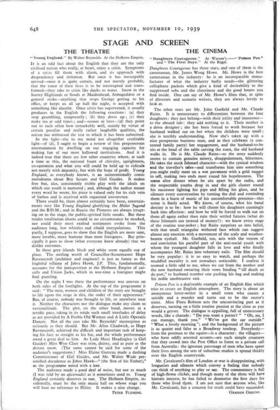STAGE AND SCREEN
THE THEATRE
" Young England." By Walter Reynolds. At the Holborn Empire.
IT is an odd fact about the English that they are the only civilised nation who really, at heart, enjoy a crisis. Symptoms of a crisis fill them with alarm, and its approach with despondency and irritation. But once it has inescapably arrived—once it is quite certain, and not merely probable, that the tenor of their lives is to be interrupted and trans- formed—they take to crisis like ducks to water. Snow in the Surrey Highlands or floods at Maidenhead, Armageddon or a general strike—anything that stops George getting to his office, or keeps us all up half the night, is accepted with something like alacrity. Once crisis has supervened, it usually produces in the English the following reactions : (a) they stop grumbling, temptrarily ; (b) they dress up ; (c) they make tea at odd times ; and—sooner or later—(d) they point out to each other how remarkably well, mainly by virtue of certain peculiar and really rather laughable qualities, the nation has withstood the test to which it has been submitted.
In the light—the to my mind not altogether creditable light—of (d), I ought to begin a review of this preposterous entertainment by dwelling on our engaging capacity for making fun of our most hallowed institutions. And it is indeed true that there are few other countries where, at such a time as this, the national fount of chivalry, uprightness, co-operation and what you will could be held up to ridicule not merely with impunity, but with the hope of profit. Young England, as everybody knows, is an unintentionally comic melodrama about Boy Scouts and Girl Guides. It makes free but, alas, consistently risible play with the ideals on which our youth is nurtured ; and, although the author meant every word he wrote, his piece is valued only for its rich vein of bathos and is received with organised irreverence.
There could be, there almost certainly have been, entertain- ments very like Young England glorifying the Hitler 7ugend and the B.D.M.; and in Russia the Pioneers are always irrupt- ing on to the stage, the public-spirited little sneaks. But these tender totalitarian shoots could in no circumstance be mocked, nor could their most exalted sentiments evoke from the audience long, low whistles and ribald interpolations. This partly, I suppose, goes to show that the English are more sane, more lovable, more humane than most foreigners. But prin- cipally it goes to show (what everyone knew already) that we dislike extremes.
In these grey islands black and white seem equally our of place. The sterling worth of Councillor-Scoutmaster Hope Ravenscroft (architect and engineer) is just as funny as the frightful villainy of Jabez Hawk, J.P. This, fundamentally, accounts for the juxtaposition at the Holborn Empire of cat- calls and Union Jacks, which in war-time a foreigner might find puzzling.
On the night I was there the performance was uneven on both sides of the footlights. At the top of the programme it said : " The men, women and children of the story are brought to life upon the stage in this, the order of their appearance." But, of course, nobody was brought to life, or anywhere near it. Neither the characters nor the dialogue make any claim to verisimilitude. The plot, on the other hand, moves at a terrific pace, taking in its stride such small interludes of delay as are provided by A Feeble Old Woman and A Little Operatic Dancer. Not all the cast take Mr. Reynolds' masterpiece as seriously as they should. But Mr. Allan Chadwick, as Hope Ravenscroft, achieved the difficult and important task of keep- ing his face as straight as his bat, and the whole performance owed a great deal to him. As Lady Mary Headingley (a Girl Guider) Miss Wyn Clare was trim, dainty, and as pure as the driven snow. (The same cannot be said for some of the audience's suggestions.) Miss Elaine Garreau made a dashing Commissioner of Girl Guides, and Mr. Walter Wade per- sonified decadence as Jabez Hawk—" (the Son of his Father)," as the programme noted with a leer.
The audience made a good deal of noise, but not as much (I was told by an aficionado) as it sometimes used to. Young England certainly deserves to run. The Holborn Empire, in- cidentally, must be the only music hall on whose stage you will hear no reference to Hitler. It makes a nice change.
PETER FLEMING.




































 Previous page
Previous page